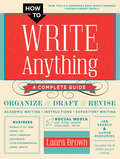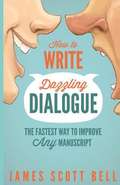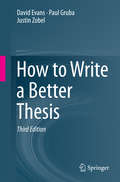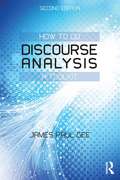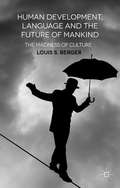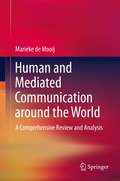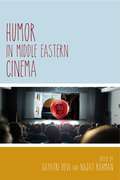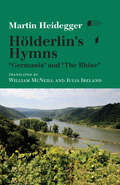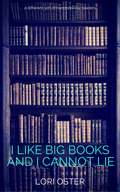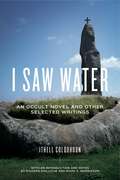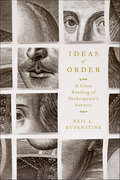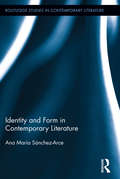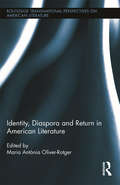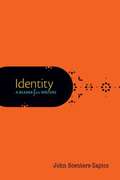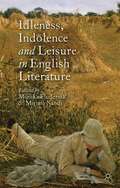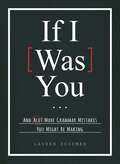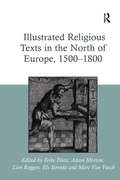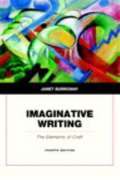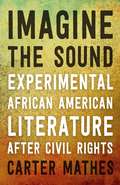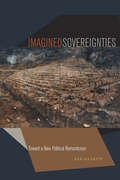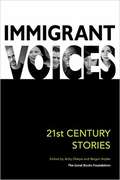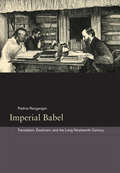- Table View
- List View
How to Write Anything: A Complete Guide
by Laura Brown“There has never been a guide as comprehensive as this to writing in all its forms. . . . Useful, clear and encyclopedic, this book is an essential guide for every household.”—Examiner Need to know how to format your résumé for that job application? How do you write a cover letter that will stand out? Wondering how to request a letter of recommendation for graduate school? Trying to craft a get-well note that will really help? How informal is too informal when instant messaging in the office? What do you write on the website for your small business? What should you say in a wedding invitation? Or a divorce announcement? With over 200 how-to entries and easy-to-use models organized into three comprehensive sections on work, school, and personal life, How to Write Anything covers a wide range of topics that make it an essential guide for the whole family.
How to Write Dazzling Dialogue: The Fastest Way to Improve Any Manuscript
by James BellThere is one sure-fire way of improving your novel fast. . . You may know the fundamentals of how to write fiction. You may be more than competent in plot, structure and characters. But if your dialogue is dull it will drag the whole story down. On the other hand, if your dialogue is crisp and full of tension it immediately grabs the reader. And if that reader is an agent or editor, sharp dialogue will give them instant assurance that you know what you're doing as a writer. Writing a bestseller or hot screenplay is no easy task, but dazzling dialogue is an absolute essential if you want to get there. The best part is, the skills of the dialogue craft are easy to understand and put into practice. #1 bestselling writing coach James Scott Bell has put together and expanded upon the dialogue lectures from his popular writing seminars. In How to Write Dazzling Dialogue you'll learn: What fictional dialogue is ... and isn't The 11 secrets of crafting memorable dialogue The 5 essential tasks of dialogue 5 ways to improve your dialogue ear 4 can't-miss methods to increase conflict and tension in any dialogue exchange The top 10 dialogue issues, and how to resolve them You'll also see dazzling dialogue in action with examples from hit novels and screenplays. Don't sabotage your chances of selling your work to readers or publishers because the dialogue is unexceptional. Dazzle them with what the characters say. How to Write Dazzling Dialogue will give you the tools to do it.
How to Write a Better Thesis
by David Evans Paul Gruba Justin ZobelFrom proposal to examination, producing a dissertation or thesis is a challenge. Grounded in decades of experience with research training and supervision, this fully updated and revised edition takes an integrated, down-to-earth approach drawing on case studies and examples to guide you step-by-step towards productive success. Early chapters frame the tasks ahead and show you how to get started. From there, practical advice and illustrations take you through the elements of formulating research questions, working with software, and purposeful writing of each of the different kinds of chapters, and finishes with a focus on revision, dissemination and deadlines. How to Write a Better Thesis presents a cohesive approach to research that will help you succeed.
How to do Discourse Analysis: A Toolkit
by James Paul GeeThis bestselling textbook is the ideal companion to An Introduction to Discourse Analysis: Theory and Method, by leading author, James Paul Gee. Using a practical how-to approach, Gee provides the tools necessary to work with discourse analysis, with engaging step-by-step tasks featured throughout the book. Each tool is clearly explained, along with guidance on how to use it, and authentic data is provided for readers to practice using the tools. Readers from all fields will gain both a practical and theoretical background in how to do discourse analysis and knowledge of discourse analysis as a distinctive research methodology. Updated throughout, this second edition also includes a new tool- 'The Big C Conversation Tool'. A new companion website www.routledge.com/cw/gee features a frequently asked questions section, additional tasks to support understanding, a glossary and free access to journal articles by James Paul Gee. How to do Discourse Analysis: A Toolkit is an essential book for advanced undergraduate and postgraduate students working in the areas of applied linguistics, education, psychology, anthropology and communication.
Human Development, Language and the Future of Mankind
by Louis S. BergerDrawing on and integrating unorthodox thought from a broad range of disciplines including clinical psychology, linguistics, philosophy, natural science and psychoanalysis, this book offers a provocative, original analysis of the global threats to our survival, and proposes a remedy.
Human and Mediated Communication around the World
by Marieke De MooijThis book is unique in the sense that it offers a comprehensive review and analysis of human communication and mediated communication around the world. This is one of the first attempts to do so in a systematic, comprehensive way. It challenges the assumption that Western theories of human communication and mass communication have universal applicability. It surveys the applicability of mass communication theories to other than Western cultures. The book explains the influence of culture on all forms of communication behavior, be it personal, mediated or mass communication. It presents communication theories from around the world, incorporating a vast body of literature from Europe, Asia, Africa and Latin America. This updated information on important international perspectives that includes both interpersonal and mediated communication is presently not readily available in other sources. The book offers an integrated approach to understanding the working of electronic means of communication that are hybrid media combining human and mediated communication. These new media that are often presented as universal are even more culture-bound than the traditional media.
Humor in Middle Eastern Cinema
by Gayatri Devi Najat RahmanWhile Middle Eastern culture does not tend to be associated with laughter and levity in the global imagination, humor--often satirical--has long been a staple of mainstream Arabic film. In Humor in Middle Eastern Cinema, editors Gayatri Devi and Najat Rahman shed light on this tradition, as well as humor and laughter motivated by other intent--including parody, irony, the absurd, burlesque, and dark comedy. Contributors trace the proliferation of humor in contemporary Middle Eastern cinema in the works of individual directors and from the perspectives of genre, national cinemas, and diasporic cinema. Humor in Middle Eastern Cinema explores what humor theorists have identified as an "emancipatory," "liberatory," even "revolutionary" function to humor. Among the questions contributors ask are: How does Middle Eastern cinema and media highlight the stakes and place of humor in art and in life? What is its relation to the political? Can humor in cinematic art be emancipatory? What are its limits for its intervention or transformation? Contributors examine the region's masterful auteurs, such as Abbas Kiarostami, Youssef Chahine, and Elia Suleiman and cover a range of cinematic settings, including Egypt, Iran, Israel, Lebanon, Palestine, Syria, Tunisia, and Turkey. They also trace diasporic issues in the distinctive cinema of India and Pakistan. This insightful collection will introduce readers to a variety of contemporary Middle Eastern cinema that has attracted little critical notice. Scholars of cinema and media studies as well as Middle Eastern cultural history will appreciate this introduction to a complex and fascinating cinema.
Hölderlin's Hymns: "Germania" and "The Rhine" (Studies in Continental Thought)
by Martin Heidegger“Translated with skill and precision, these lectures . . . present the most penetrating analysis of two of Hölderlin’s most significant hymns” (Choice).Martin Heidegger’s 1934–1935 lectures on Friedrich Hölderlin’s hymns “Germania” and “The Rhine” are considered the most significant among Heidegger’s lectures on Hölderlin. Coming at a crucial time in his career, the text illustrates Heidegger’s turn toward language, art, and poetry while reflecting his despair at his failure to revolutionize the German university and his hope for a more profound revolution through the German language, guided by Hölderlin’s poetry.These lectures are important for understanding Heidegger’s changing relation to politics, his turn toward Nietzsche, his thinking about the German language, and his breakthrough to a new kind of poetic thinking.“[This translation], including a clear and concise introduction and useful glossaries, attains both accuracy and clarity, rarely faltering in its choice of words.” —Notre Dame Philosophical Reviews
I Like Big Books and I Cannot Lie: A Different Sort of Handbook for Readers
by Lori OsterThis book presents the reading skills in detail and guides to help readers transform their ways of thinking about text.
I Saw Water: An Occult Novel and Other Selected Writings
by Ithell Colquhoun Richard Shillitoe Mark S. MorrissonIthell Colquhoun (1906–1988) is remembered today as a surrealist artist, writer, and occultist. Although her paintings hang in a number of public collections and her gothic novel Goose of Hermogenes (1961) remains in print, critical responses to her work have been severely constrained by the limited availability of her art and writings. The publication of her second novel, I Saw Water—presented here for the first time, together with a selection of her other writings and images, many also previously unpublished—marks a significant step in expanding our knowledge of Colquhoun’s work. Composed almost entirely of material assembled from the author’s dreams, I Saw Water challenges such fundamental distinctions as those between sleeping and waking, the two separated genders, and life and death. It is set in a convent on the Island of the Dead, but its spiritual context derives from sources as varied as Roman Catholicism, the teachings of the Theosophical Society, Goddess spirituality, Druidism, the mystical Qabalah, and Neoplatonism.The editors have provided both an introduction and explanatory notes. The introductory essay places the novel in the context of Colquhoun’s other works and the cultural and spiritual environment in which she lived. The extensive notes will help the reader with any concepts that may be unfamiliar.
I Saw Water: An Occult Novel and Other Selected Writings
by Ithell ColquhounIthell Colquhoun (1906–1988) is remembered today as a surrealist artist, writer, and occultist. Although her paintings hang in a number of public collections and her gothic novel Goose of Hermogenes (1961) remains in print, critical responses to her work have been severely constrained by the limited availability of her art and writings. The publication of her second novel, I Saw Water—presented here for the first time, together with a selection of her other writings and images, many also previously unpublished—marks a significant step in expanding our knowledge of Colquhoun’s work. Composed almost entirely of material assembled from the author’s dreams, I Saw Water challenges such fundamental distinctions as those between sleeping and waking, the two separated genders, and life and death. It is set in a convent on the Island of the Dead, but its spiritual context derives from sources as varied as Roman Catholicism, the teachings of the Theosophical Society, Goddess spirituality, Druidism, the mystical Qabalah, and Neoplatonism.The editors have provided both an introduction and explanatory notes. The introductory essay places the novel in the context of Colquhoun’s other works and the cultural and spiritual environment in which she lived. The extensive notes will help the reader with any concepts that may be unfamiliar.
Iambic Poetics in the Roman Empire
by Tom HawkinsThis is the first book to study the impact of invective poetics associated with early Greek iambic poetry on Roman imperial authors and audiences. It demonstrates how authors as varied as Ovid and Gregory Nazianzen wove recognizable elements of the iambic tradition (e. g. meter, motifs, or poetic biographies) into other literary forms (e. g. elegy, oratorical prose, anthologies of fables), and it shows that the humorous, scurrilous, efficacious aggression of Archilochus continued to facilitate negotiations of power and social relations long after Horace's Epodes. The eclectic approach encompasses Greek and Latin, prose and poetry, and exploratory interludes appended to each chapter help to open four centuries of later classical literature to wider debates about the function, propriety and value of the lowest and most debated poetic form from archaic Greece. Each chapter presents a unique variation on how these imperial authors became Archilochus – however briefly and to whatever end.
Ideas of Order: A Close Reading of Shakespeare's Sonnets
by Neil L. RudenstineShakespeare's sonnets are the greatest single work of lyric poetry in English, as passionate and daring as any love poems we may ever encounter, and yet, they are often misunderstood. Ideas of Order: A Close Reading of Shakespeare's Sonnets reveals an underlying structure within the 154 poems that illuminates the entire work, and provides a guide—for first-time readers as well as scholars—that inspires a new understanding of this complex masterpiece. Elizabethan scholar and former Harvard University president Neil L. Rudenstine makes a compelling case for the existence of a dramatic arc within the work through an expert interpretation of distinct groups of sonnets in relationship to one another. The sonnets show us a poet in turmoil whose love for a young man—who returns his affections—is utterly transformative, binding him in such an irresistible way that it survives a number of infidelities. And the poet and the young man are drawn in to a cycle of lust and betrayal by a "dark lady," a woman with the "power to make love groan." Rudenstine's reading unveils the relationship between major groups of poems: the expressions of love, the transgressions, the longings, the jealousies, and the reconciliations. This critical analysis is accompanied by the text of all of Shakespeare's sonnets. Accessible and thought-provoking, Ideas of Order is an invaluable companion to this cornerstone of literature.
Identity and Form in Contemporary Literature (Routledge Studies in Contemporary Literature)
by Ana María Sánchez-ArceThis ambitious and wide-ranging essay collection analyses how identity and form intersect in twentieth- and twenty-first century literature. It revises and deconstructs the binary oppositions identity-form, content-form and body-mind through discussions of the role of the author in the interpretation of literary texts, the ways in which writers bypass or embrace identity politics and the function of identity and the body in form. Essays tackle these issues from a number of positions, including identity categories such as (dis)ability, gender, race and sexuality, as well as questioning these categories themselves. Essayists look at both identity as form and form as identity. Although identity and form are both staples of current research on contemporary literature, they rarely meet in the way this collection allows. Authors studied include Beryl Bainbridge, Samuel Beckett, John Berryman, Brigid Brophy, Angela Carter, J.M. Coetzee, Anne Enright, William Faulkner, Mark Haddon, Ted Hughes, Kazuo Ishiguro, B.S. Johnson, A.L. Kennedy, Toby Litt, Hilary Mantel, Andrea Levy, Robert Lowell, Ian McEwan, Flannery O’Connor, Alice Oswald, Sylvia Plath, Jeremy Reed, Anne Sexton, Edith Sitwell, Wallace Stevens, Jeremy Reed, Jeanette Winterson and Virginia Woolf. The book engages with key theoretical approaches to twentieth- and twenty-first century literature of the last twenty years while at the same time advancing new frameworks that enable readers to reconsider the identity and form conundrum. In both its choice of texts and diverse approaches, it will be of interest to those working on English and American Literatures, gender studies, queer studies, disability studies, postcolonial literature, and literature and philosophy.
Identity, Diaspora and Return in American Literature (Routledge Transnational Perspectives on American Literature)
by Maria Antònia Oliver-RotgerThis volume combines literary analysis and theoretical approaches to mobility, diasporic identities and the construction of space to explore the different ways in which the notion of return shapes contemporary ethnic writing such as fiction, ethnography, memoir, and film. Through a wide variety of ethnic experiences ranging from the Transatlantic, Asian American, Latino/a and Caribbean alongside their corresponding forms of displacement - political exile, war trauma, and economic migration - the essays in this collection connect the intimate experience of the returning subject to multiple locations, historical experiences, inter-subjective relations, and cultural interactions. They challenge the idea of the narrative of return as a journey back to the untouched roots and home that the ethnic subject left behind. Their diacritical approach combines, on the one hand, a sensitivity to the context and structural elements of modern diaspora; and on the other, an analysis of the individual psychological processes inherent to the experience of displacement and return such as nostalgia, memory and belonging. In the narratives of return analyzed in this volume, space and identity are never static or easily definable; rather, they are in-process and subject to change as they are always entangled in the historical and inter-subjective relations ensuing from displacement and mobility. This book will interest students and scholars who wish to further explore the role of American literature within current debates on globalization, migration, and ethnicity.
Identity: A Reader For Writers
by John Scenters-ZapicoIdentity: A Reader for Writers focuses on the essential topic of identity as it relates to culture, rhetoric, and the multiple modes of expression that are increasingly common in today's multilingual society. Each chapter in this reader asks students foundational questions about identity. These questions include: Where are you from? Where did you go to school? What do you do for work? And whom do you love? While these questions appear easy to answer, students will learn as they work through the readings that their answers are linked to meaningful themes including language, nationality,labor, education, personal relationships, and privacy. Developed for the freshman composition course, Identity: A Reader for Writers includes an interdisciplinary mix of public, academic, and scientific reading selections, providing students with the rhetorical knowledge and compositional skills required to participate effectively in discussions about critical literacy, cultural studies, and the writing process. Identity: A Reader for Writers is part of a series of brief single-topic readers from Oxford University Press designed for today's college writing courses. Each reader in this series approaches a topic of contemporary conversation from multiple perspectives.
Idleness, Indolence and Leisure in English Literature
by Monika Fludernik Miriam Nandi'Trouble springs from idleness, and grievous toil from needless ease' (Benjamin Franklin). Such negative evaluations of idleness and their contrary, positive reevaluations, as in Cyril Connolly's 'Idleness is only a coarse name for my infinite capacity for living in the present', have been common attitudes towards leisurely disporting and idle repose. This collection of essays traces the history of representations of idleness, indolence and leisure in English literature from the late Middle Ages to the present day. It focuses on issues as varied as the figure of the idle apprentice in the Elizabethan pamphlet wars, the 'lazy native' in British colonial discourse, positive re-evaluations of indolence and repose in the Romantic era and the delights of tramping in early twentieth-century prose. The contributions also significantly inflect current theoretical debates on race, class and gender. The topicality of the subject is emphasized by two pieces of sociological analysis which serve as epilogues to the volume.
If I Was You...: And Alot More Grammar Mistakes You Might Be Making
by Lauren SussmanAn essential handbook for righting grammatical errors!Was the computer affected by a virus or effected by it? Did you see two deers in the woods or two deer? Should the lab report be sent to Tom and me or Tom and I?If I Was You... provides the tools you need to correct the grammatical mistakes you've been making. Each entry includes sample sentences that highlight the error as well as a straightforward explanation of why it's wrong and the correct grammar usage. Whether you're working on a term paper or an important business presentation, this indispensable handbook shows you how to rectify your grammatical goofs and effectively communicate with others.Covering everything from verbs and pronouns to punctuation and sentence structure, If I Was You... is the only guide you need to master the principles of grammar, avoid common errors, and write more impressively.
Illustrated Religious Texts in the North of Europe, 1500-1800
by Adam Morton Feike Dietz Lien RoggenIn recent years many historians have argued that the Reformation did not - as previously thought - hamper the development of Northern European visual culture, but rather gave new impetus to the production, diffusion and reception of visual materials in both Catholic and Protestant milieus. This book investigates the crosscurrents of exchange in the realm of illustrated religious literature within and beyond confessional and national borders, and against the background of recent insights into the importance of, on the one hand material, as well as on the other hand, sensual and emotional aspects of early modern culture. Each chapter in the volume helps illuminate early modern religious culture from the perspective of the production of illustrated religious texts - to see the book as object, a point at which various vectors of early modern society met. Case studies, together with theoretical contributions, shed light on the ways in which illustrated religious books functioned in evolving societies, by analysing the use, re-use and sharing of illustrated religious texts in England, France, the Low Countries, the German States, and Switzerland. Interpretations based on points of material interaction show us how the most basic binaries of the early modern world - Catholic and Protestant, word and image, public and private - were disrupted and negotiated in the realm of the illustrated religious book. Through this approach, the volume expands the historical appreciation of the place of imagery in post-Reformation Europe.
Imaginative Writing: The Elements of Craft
by Janet BurrowayWritten by bestselling author Janet Burroway, Imaginative Writing, covers all four genres: creative nonfiction, fiction, poetry, and drama. This textbook discusses elements of craft common to all creative writing before delving into the individual genres. After an introduction, the next five chapters each investigate a specific element of craft–Image, Voice, Character, Setting, and Story–from a perspective that crosses all genres. Nearly half of the selections in all four genres are new. New "Try This" exercises give students plenty of practice. Imaginative Writing is a very popular book for courses on teaching the craft of creative writing.
Imagine the Sound: Experimental African American Literature after Civil Rights
by Carter MathesThe post–Civil Rights era was marked by an explosion of black political thought and aesthetics. Reflecting a shifting horizon of expectations around race relations, the unconventional sounds of free jazz coupled with experimental literary creation nuanced the push toward racial equality and enriched the possibilities for aesthetic innovation within the Black Arts Movement. In Imagine the Sound, Carter Mathes demonstrates how African American writers used sound to further artistic resistance within a rapidly transforming political and racial landscape. While many have noted the oral and musical qualities of African American poetry from the post–Civil Rights period, Mathes points out how the political implications of dissonance, vibration, and resonance produced in essays, short stories, and novels animated the ongoing struggle for equality. Situating literary works by Henry Dumas, Larry Neal, and Toni Cade Bambara in relation to the expansive ideas of sound proposed by free jazz musicians such as Marion Brown and Sun Ra, not only does this book illustrate how the presence of sound can be heard and read as political, but it recuperates critically neglected, yet important, writers and musicians. Ultimately, Mathes details how attempts to capture and render sound through the medium of writing enable writers to envision alternate realities and resistance outside of the linear frameworks offered by the Civil Rights and Black Power movements.In precise and elegant prose, Mathes shows how in conceptualizing sound, African American writers opened up the political imaginations of their readers. By exploring this intellectual convergence of literary artistry, experimental music, and sound theory, Imagine the Sound reveals how taking up radically new forms of expression allows us to speak to the complexities of race and political resistance.
Imagined Sovereignties: Toward a New Political Romanticism
by Kir KuikenImagined Sovereignties argues that the Romantics reconceived not just the nature of aesthetic imagination but also the conditions in which a specific form of political sovereignty could be realized through it.Articulating the link between the poetic imagination and secularized sovereignty requires more than simply replacing God with the subjective imagination and thereby ratifying the bourgeois liberal subject. Through close readings of Blake, Coleridge, Wordsworth, and Shelley, the author elucidates how Romanticism’s reassertion of poetic power in place of the divine sovereign articulates an alternative understanding of secularization in forms of sovereignty that are no longer modeled on transcendence, divine or human.These readings ask us to reexamine not only the political significance of Romanticism but also its place within the development of modern politics. Certain aspects of Romanticism still provide an important resource for rethinking the limits of the political in our own time. This book will be a crucial source for those interested in the political legacy of Romanticism, as well as for anyone concerned with critical theoretical approaches to politics in the present.
Immigrant Voices: 21st Century Stories
by Great StaffThe eighteen stories collected in Immigrant Voices highlight the complex relationships of immigrants in the United States at the beginning of the twenty-first century with their families, friends, new surroundings, and home countries. The authors themselves have made many of the same kinds of transitions as the characters they portray, and they offer fresh perspectives on the immigrant experience. Coedited by award-winning author Achy Obejas and cultural studies scholar Megan Bayles, this anthology addresses the perennial questions about society and the individual that the authors of the Great Books have pondered for centuries.
Imperatives
by Mikhail Kissine Mark JaryImperative sentences usually occur in speech acts such as orders, requests, and pleas. However, they are also used to give advice, and to grant permission, and are sometimes found in advertisements, good wishes and conditional constructions. Yet, the relationship between the form of imperatives, and the wide range of speech acts in which they occur, remains unclear, as do the ways in which semantic theory should handle imperatives. This book is the first to look systematically at both the data and the theory. The first part discusses data from a large set of languages, including many outside the Indo-European family, and analyses in detail the range of uses to which imperatives are put, paying particular attention to controversial cases. This provides the empirical background for the second part, where the authors offer an accessible, comprehensive and in-depth discussion of the major theoretical accounts of imperative semantics and pragmatics.
Imperial Babel: Translation, Exoticism, and the Long Nineteenth Century
by Padma RangarajanAt the heart of every colonial encounter lies an act of translation. Once dismissed as a derivative process, the new cultural turn in translation studies has opened the field to dynamic considerations of the contexts that shape translations and that, in turn, reveal translation’s truer function as a locus of power. In Imperial Babel, Padma Rangarajan explores translation’s complex role in shaping literary and political relationships between India and Britain.Unlike other readings that cast colonial translation as primarily a tool for oppression, Rangarajan’s argues that translation changed both colonizer and colonized and undermined colonial hegemony as much as it abetted it. Imperial Babel explores the diverse political and cultural consequences of a variety of texts, from eighteenth-century oriental tales to mystic poetry of the fin de siecle and from translation proper to its ethnological, mythographic, and religious variants.Searching for translation’s trace enables a broader, more complex understanding of intellectual exchange in imperial culture as well as a more nuanced awareness of the dialectical relationship between colonial policy and nineteenth-century literature. Rangarajan argues that while bearing witness to the violence that underwrites translation in colonial spaces, we should also remain open to the irresolution of translation, its unfixed nature, and its ability to transform both languages in which it works.
